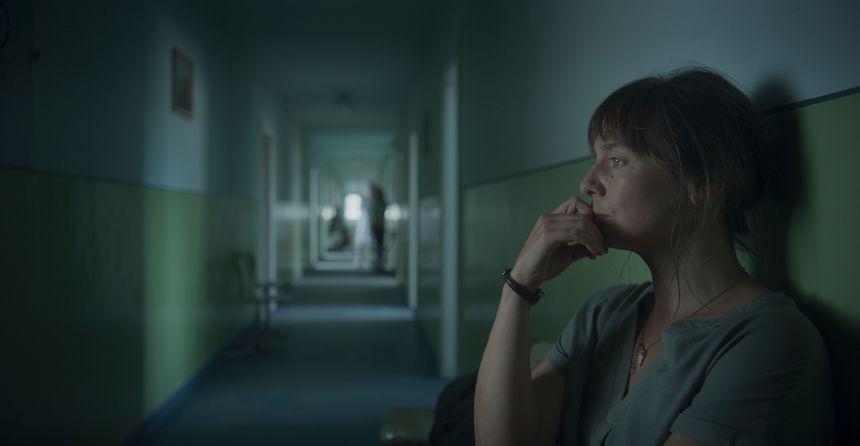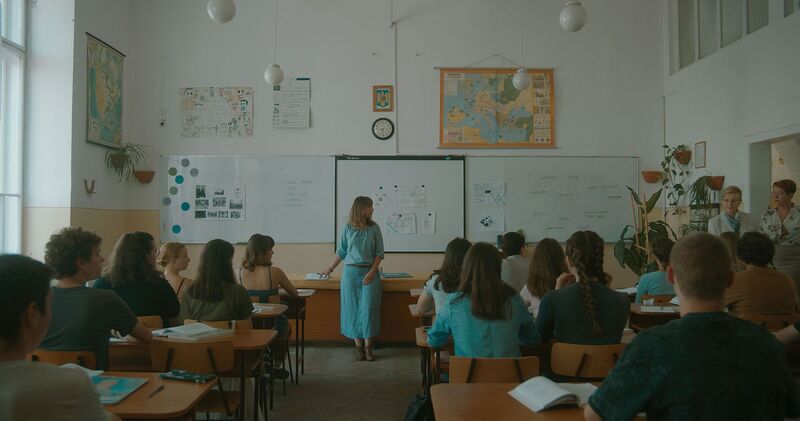Warsaw 2023 Review: WITHOUT AIR Seeks Justice in a Suffocating System
Directed by Katalin Moldovai, the Hungarian film stars Ágnes Krasznahorkai, Tunde Skovran, Áron Dimenyi, Soma Sandor, Zsolt Bolonyi, and Ágnes Lorincz.

Hungarian filmmaker, Katalin Moldovai, recently presented her feature-length debut, a civil drama titled Without Air. Inspired by a true event, the narrative centers on Ana Bauch, a respected teacher. She confronts escalating challenges stemming from an ostensibly trivial circumstance, which ultimately engulfs her professional career.
Ana, portrayed by Ágnes Krasznahorkai, is among the distinct group of teachers who view their profession not merely as a vocation but as a mission. She is dedicated to expanding the horizons of teenagers and equipping them for their future. Ana instructs a literature course at a high school. Concurrently, she has been assigned the responsibility of organizing a cultural program to commemorate the school's 150th anniversary.
Meanwhile, the principal is seizing this occasion to secure funding for a new gymnasium. Amidst these events, Ana, known for her clarity, honesty, and forthrightness, suggests students explore a supplementary material — the film Total Eclipse by Agnieszka Holland. Holland's recent work, Green Border, has sparked political controversy in her native country. The recommended film provides insights into the life and work of Arthur Rimbaud.
The situation escalates when a reserved student views the film at home, and his less restrained and more judgmental father discovers certain elements in the film he deems immoral. Without hesitation, the father addresses his concerns to the school's principal, Eva, played by Tünde Skovrán. Already managing multiple responsibilities, Eva initiates a formal inquiry to be presented before the school's ethical board.
The aim is to formally reprimand Ana, require her to apologize, and implement a salary deduction, with the intent of resolving the matter swiftly. However, for Ana, it's not just an administrative procedure; it's a matter of principle. She resists having her reputation tarnished over what she perceives as an innocuous and educational recommendation. This marks the beginning of Ana's challenge against institutional bureaucracy, characterized by a growing atmosphere of intolerance and unawareness.
Moldovai, collaborating with Zita Palóczi on the script, delivers a depiction deeply rooted in Central European realities, making it challenging to discern where fact ends and artistic interpretation begins. Teachers, especially those who approach their roles with profound dedication, often find themselves underpaid and overburdened. Such is the situation for Ana. Her personal relationship strains as her partner works abroad for a better wage, and the sustainability of their long-distance relationship becomes uncertain.
Faced with a choice, Ana must decide whether to leave Hungary to preserve the relationship or stay and risk its dissolution. Complicating matters, Ana tends to her retired mother at home, navigating her clear aversion to the idea of a retirement facility. Simultaneously, Ana's once unblemished reputation is now under threat, jeopardized by an individual's biases. This forces her to reevaluate her path, considering the entirety of her situation.
Moldovai presents a restrained drama that focuses on a woman navigating both professional and personal challenges within her institution. The public sector operates by stringent regulations, and a principal, who once appeared supportive of Ana, becomes confrontational when Ana declines both a tarnish to her reputation and a salary reduction. Consequently, Ana finds herself isolated in a dispute that rapidly escalates beyond its initial scope.
Without Air, though rooted in true events, serves as a platform for the director to craft a sociocultural commentary reflective of Eastern European realities, particularly in the context of prominent right-wing politics. There's a noticeable power imbalance, with increasing oppression supported by individuals previously deemed benign. This atmosphere evolves into a system that seeks to placate, often at the expense of those who haven't wronged anyone.
The restrained and focused style of Without Air is reminiscent of Lili Horvát's unconventional romance drama, Preparations to Be Together For an Unknown Period of Time. However, Moldovai's film stands as a low-fidelity social realist thriller. It depicts how bureaucracy can transform a diligent individual into a target, especially when confronted by the grievances of a single disgruntled parent.
Without Air emerges as a pertinent reflection on the fragility of professional integrity and the challenges posed by prevailing societal currents. Moldovai's astute direction and the film's layered narrative offer a stark reminder of the complexities inherent in standing by one's convictions in a landscape prone for conformism, complacency, oppression and intolerance. While the film is rooted in specific geographical and political contexts, its themes resonate universally, emphasizing the value of introspection and the courage to navigate systemic challenges while Moldovai accentuates the generational position.
Without Air won the Competition 1-2 Award along with FIPRESCI Award for the best debut and Young FIPRESCI Award for the best debut from Eastern Europe at the Warsaw Film Festival.








